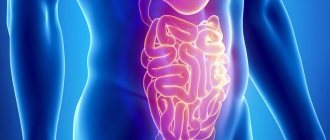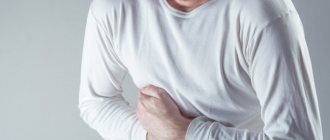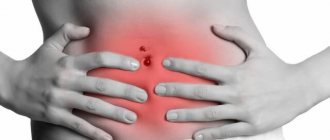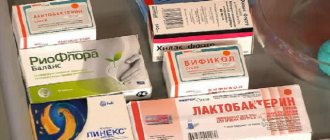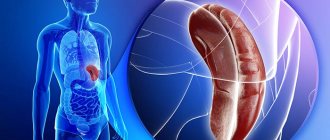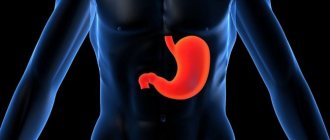Types of rumbling
Gurgling occurs when there is too much activity within the gastrointestinal tract. Basically, a person does not hear how the digestion process occurs. However, in some cases noises are heard, which can be of several types:
- growl;
- bubbling;
- gurgling.
Most often, this is a signal that heavy food has been eaten, hard pieces have been poorly chewed, and the person is experiencing hunger or overeating. Frequent rumbling may be a sign of illness. Basically, all noises are similar and can even appear simultaneously.
Rumbling after a meal is normal if it does not start immediately, but some time after eating. During this process, a person swallows air. When it enters the intestines, it can cause a slight seething. However, very loud sounds may indicate the presence of an ulcer or gastritis.
The cause of nighttime rumbling can be overeating before bed or hunger. Seething may also occur when a person takes an uncomfortable position or gases are removed from the body.
Seething on the right may indicate the appearance of diseases of the gallbladder, duodenum or liver. If grumbling is heard on the left, this is a sign of active intestinal motility. Often such sounds accompany intoxication of the body, food poisoning or infectious gastroenteritis.
Rumbling in the stomach occurs in almost all pregnant women. This is normal, since a woman’s hormonal levels change and the tone of the intestines and uterus decreases. This leads to the accumulation of gases and, as a result, rumbling occurs in the stomach.
In childhood, rumbling is most often heard in infants. This is not scary, since the composition of the child’s microflora changes and the body adapts to new living conditions. Also, seething accompanies a change in nutrition - from mother's milk to regular food.
Normal limits
Seething in the stomach occurs periodically in every person. More often it is associated with insufficient or excessive food consumption.
You can distinguish normal from pathology by the nature, intensity of sound, and accompanying symptoms.
But in addition to acceptable noise, pathological seething is also distinguished. It is diagnosed throughout the day and is accompanied by discomfort. In this case, timely consultation with a gastroenterologist is necessary, since the processes of rotting and fermentation can have a lot of negative complications.
Why does the intestines growl (physiological reasons)
If you hear rumbling in the intestinal area, the reasons are divided into two types - physiological, arising as a result of a certain lifestyle, or when the rumbling indicates an illness.
In the first case, the provoking factors for rumbling are:
- Hunger. During normal functioning of the stomach, it produces juice, which promotes active digestion of food. However, if it is not supplied for a long time, the person experiences hunger, which causes rumbling in the intestines. More often this happens in the morning, after waking up.
- Stress and emotional overload. When the nervous system is highly stressed, it greatly affects digestion. The normal functioning of the gastrointestinal tract is disrupted.
- Increased gas formation. It can occur after drinking carbonated drinks (kvass, beer, mineral water, etc.) or foods that cause fermentation.
- Binge eating. Strong rumbling in the intestines occurs when there is a lot of food in the stomach. Especially if the person was previously on a diet or ate small portions.
- Heavy food (especially if it is poorly chewed). Boiling also often occurs after eating fatty foods that are difficult to digest or take a long time to digest. The movement of large lumps of food through the gastrointestinal tract is accompanied by rumbling.
Excessive stomach motility can cause such strong seething that a person additionally feels nausea, pain, and belching occurs.
Main reasons
Rumbling can occur for the following reasons:
- Use of medications that have side effects such as flatulence.
- Lactose intolerance.
- Insufficient grinding of food.
- Drinking carbonated water and alcohol.
- Diseases of the gastrointestinal tract.
- Diarrhea (diarrhea is characterized by rumbling in the intestinal area).
- Premenstrual period in women.
- Hormonal imbalance.
- Pregnancy.
- Poisoning.
Physiological reasons
In a hungry person, rumbling occurs due to the interaction of air, carbon dioxide and hydrochloric acid in the digestive tract. If food arrives in a timely manner, then it, passing through the compressed walls of the gastrointestinal tract, muffles these sounds.
When your stomach rumbles after eating, this indicates the process of digestion.
Rumbling is typical when overeating, when undigested particles form a lump and put pressure on the stomach muscles, which, trying to cope with the load, begin to work more intensely.
Frequent overeating leads to gastritis, since increased gastrointestinal function requires a large amount of hydrochloric acid.
If the frequency and volume of secretion production is disrupted, the dysfunction provokes excessive production of bile, regardless of the time and amount of food eaten.
Physiological reasons may also include:
- psychological imbalance: grumbling is characteristic of overly emotional individuals during a stressful situation;
- eating heavy foods because the muscles cannot cope with the load and they have to work harder;
- late dinner: you should not go to bed immediately after eating, as this slows down the digestion process and becomes more complicated;
- improper nutrition, when food provokes increased gas formation.
Rumbling - as evidence of a disease
Frequent rumbling in the intestines can be caused not by harmless factors, but by diseases. For example:
- Gastric pathology of infectious origin.
- Obstruction of the large or small intestine.
- Digestive system disorders due to foreign objects entering the gastrointestinal tract.
- Lactose deficiency, causing gas accumulation.
- Allergy to certain types of foods.
- Gastroenteritis caused by infection.
- Colitis, when inflammation of the mucous membrane is accompanied by flatulence, bloating or tenesmus.
- All forms of gastritis. In this case, additional sour belching, severe gas formation, and nausea may appear.
Also included in this category is alcoholism or occasional excessive drinking.
Motor impairment
Impaired intestinal motility prevents food from moving normally through the gastrointestinal tract. At the same time, digestive processes are disrupted. The lump of food begins to move very slowly, and fermentation processes are activated. The food is not completely digested, and the leftover residue accumulates and begins to rot.
This all makes me rumbling. At the same time, food stagnates and toxins that poison the body begin to be released. Impaired motor skills are already a consequence of diseases (oncology, gastritis, etc.) and can lead to other pathologies.
Intestinal inflammation
When there is boiling in the intestines, many pathologies can contribute to this. They provoke inflammation. For example, infections when bacteria enter the intestines - Shigella, Salmonella and even protozoa. As a result, the microflora is disrupted, and inflammation is caused by dominant pathogenic organisms.
The cause of rumbling can be parasites or autoimmune processes. Then the immune system confuses native cells with foreign ones and begins to fight them. Another reason may be poor blood supply to the vessels. This occurs due to thinning of the arteries or atherosclerotic changes.
Irritable bowel
Irritable bowel syndrome is accompanied not only by flatulence, bowel dysfunction or pain, but also by gurgling sounds in the intestines. In this case, diseases are often the cause. The syndrome mainly occurs on a nervous basis, with a decrease in receptor sensitivity.
Dysbacteriosis and flatulence
With dysbacteriosis, seething is constantly heard in the intestines. This is due to an imbalance between beneficial and pathogenic microorganisms that live on the mucous membranes of the gastrointestinal tract. As a result, food processing is disrupted, its remains rot, and fermentation processes occur. Most often this happens with any form of gastritis.
Rumbling causes flatulence, which is formed against the background of changes in intestinal microflora. Microorganisms produce more and more gases, which slows down normal digestion of food or causes intestinal distension. Flatulence often occurs against the background of serious illnesses. For example:
- oncological;
- liver cirrhosis;
- Crohn's disease;
- cholecystitis;
- enteritis.
One of the most common diseases that causes flatulence and, as a result, rumbling in the stomach is all types of gastritis. This disrupts the functioning of the intestines.
Symptoms of the disease
In addition to the banal causes of malnutrition or drinking large amounts of carbonated drinks, rumbling indicates the development of serious diseases. Dysbacteriosis, gastritis, intoxication - this is not a complete list of possible diseases.
Rumbling in the lower abdomen
The source of noise located in the lower abdomen is a signal of intestinal disorder. The sound is accompanied by pain, bloating, nausea and vomiting, indicating the development of dysbacteriosis. Often the same symptoms can belong to different diseases. A single symptom does not make it possible to determine the true source of the disease.
The disease gastritis is accompanied by noise in the lower abdominal cavity and pain. There are cases that occur without obvious signs, exclusively at an early stage.
Rumbling that goes away on its own does not mean a threat. But rumbling that is repeated over a long period of time, especially if pain is present, requires serious evaluation and mandatory consultation with a doctor.
Rumbling on the left side
Noise in the left side of the abdomen indicates increased peristalsis of the colon or stomach. Food that is formed into a lump moves too quickly through the digestive tract. The chemical treatment of this lump to release digestive enzymes is delayed. This means that digestion of food becomes difficult. The process that occurs is called intestinal hyperactivity. Similar symptoms under the left rib appear in a patient with infectious gastroenteritis.
Abuse of alcoholic beverages, ingestion of toxins and poisonous substances into the body are the reasons that cause rumbling on the left side of the abdomen, when it still radiates under the ribs.
Stress is an important cause of left abdominal noise. Diarrhea and allergies to certain substances contained in foods are the cause of discomfort and sounds in the abdominal area.
Rumbling on the right side
Discomfort on the right side, extending to the hypochondrium, appears less frequently than the previous symptoms, but is no less serious. Rumbling and sour belching indicate diseases of the liver, gall bladder and pancreas - pancreatitis and cholecystitis.
The pathology of the inflamed gallbladder is manifested by pain under the right rib. Noise, upset and pain in the right side of the abdomen indicate poisoning of the body. Measures to eliminate the infection by gastric lavage should be carried out without delay.
Rumbling on the right may simply indicate hunger, but it is advisable to visit a medical facility and find out the true cause of the noise in the stomach.
Causes of constant rumbling in the intestines
The reasons for constant rumbling can be varied. For example, if a person overeats all the time or goes hungry. Other reasons include:
- dysbacteriosis;
- constipation, when stool does not find a way out of the body;
- flatulence;
- adhesions;
- oncological diseases;
- polyps;
- inflammation (mainly enteritis or gastritis);
- parasites;
- diseases of the upper gastrointestinal tract;
- intestinal strictures.
Any of the listed factors and conditions lead to constant rumbling of the intestines. Often the seething occurs every day and several times, usually immediately after eating. In this case, additional bloating may occur, which even provokes pain. If the rumbling is episodic, then this does not indicate disease.
The connection between drinking water and rumbling
After drinking large amounts of water, a strong noise in the stomach may occur. This is due to intense absorption of fluid.
Soda and alcohol act differently: fizzy drinks increase gas formation in the digestive tract, they affect the release of hydrochloric acid, causing hyperfunctionality of the system.
Treatment for rumbling
Before treatment, the cause of the intestinal turmoil is determined. Then an effective therapeutic regimen is selected, which includes several areas at once, mainly medication and diet. Folk remedies are used as auxiliaries. If tumors are present, surgery is performed.
However, drastic measures are not always required. Sometimes just having a snack is enough. Food will enter the stomach and unpleasant sounds will disappear. You should also exclude caffeine and sweets from your diet (even temporarily), and drink as much water as possible. Food should be chewed thoroughly and should not be eaten dry.
Medication direction
What to do if your intestines are constantly seething? Regular activated carbon is very effective. It can be taken without a doctor’s prescription if the cause of the seething is not a disease. However, you need to use the product without exceeding the dosage indicated in the annotation. Coal has the ability to absorb not only harmful, but also beneficial substances. Also, to restore digestion, a number of drugs are prescribed from the following table:
| Prebiotics | They feed the beneficial intestinal microflora (Lactuose, Duflac). |
| Antibiotics | "Levomycetin", "Amoxiclav", etc., destroying harmful microorganisms. However, such drugs are used only for serious intestinal inflammation. |
| Antispasmodics | Relieves spastic manifestations and reduces intestinal tone (“Drotaverine”, “Papaverine”). |
| Probiotics | Contains live bacteria (“Lactobacterin”, “Bifidumbacterin”, “Bifiform”). |
| Hemostatics | “Vikasol”, “Etamzilat”, etc., promote rapid blood clotting and stop bleeding. However, such medications are prescribed only for capillary lesions that are caused by foreign bodies or parasites. |
| Synbiotics | They consist of pre- and probiotics (Maxilak and its analogues). |
The list of medications may be different. It depends on the reasons that caused the rumbling in the intestines. If the patient has malignant tumors, cytotoxic drugs may be prescribed. For intestinal obstruction, the therapeutic regimen includes parenteral antibiotics, immunostimulants and regenerative agents.
Diet
Diet is an integral part of complex treatment for gastrointestinal diseases, including when rumbling is one of the symptoms. Poorly digestible foods, as well as those that cause fermentation, are excluded from the diet:
- sorrel;
- legumes;
- cabbage;
- yeast.
All carbonated drinks (beer, soft drinks, energy drinks, etc.) and alcohol should be excluded from the diet. The menu should include low-fat soups and cereals, bran bread, and dairy products.
Rose hip decoction and cranberry juice have a beneficial effect on the gastrointestinal mucosa. They restore microflora. You need to consume foods that contain bifidobacteria and lactobacilli every day. Before going to bed, it is advisable to drink a glass of yogurt or kefir.
Folk remedies
There are many folk recipes on how to get rid of rumbling in the intestines. For example, you can make an infusion of parsley. Take 15-20 g of plant roots and pour 100 ml of boiling water. The product is infused for 8 hours, then drunk a quarter of an hour before meals, 1 tbsp. l. 4 times a day.
You can also use dandelion roots. They are crushed and 2 tsp. raw materials are poured with 200 ml of boiling water. Then it is infused for 8 hours, and the product is drunk before meals, 50 ml.
According to another recipe, take 2 tbsp. l. dried plantain and St. John's wort. They are mixed with 1 tbsp. l. oak bark. The plants are poured with 500 ml of boiling water and infused for a couple of hours. Then the product is drunk an hour after the meal, half a glass. The infusion should be consumed three times a day. These are the most effective, but not all possible recipes. For example, it is recommended to drink freshly squeezed potato juice in the morning.
Physiotherapy
To eliminate the seething in the intestines, the reasons are very important. If the rumbling occurs due to accumulated gases, then therapeutic exercises will help remove the negative symptom. During intense movements, excess gases come out. Exercises are done mainly in a lying position. You can just lie on your stomach. Other types of physical therapy include swimming, running, and yoga.
In any case, before you begin to treat rumbling in the intestines, you need to find out the cause of its occurrence. If this is a disease, then it needs treatment. In other cases, you can use traditional medicine and exercise therapy. To prevent rumbling, you need to lead a healthy and active lifestyle.
Reducing discomfort
To alleviate the condition and eliminate the causes of rumbling in the stomach, it is enough to remember some rules:
- Doctors recommend giving up sugar substitutes, which are found in various foods, for a while. These are sweets, chewing gum, carbonated drinks, sauces. This can prevent stomach grumbling after eating.
- You should eat right. While eating, chew with your mouth closed to prevent the accumulation of large amounts of gas.
- A person who eats cabbage, legumes, fresh vegetables and fruits, dairy products, as well as fresh baked goods will suffer from constant churning in the stomach. You should not use them, especially before extremely important events. To reduce stomach rumbling from legumes, it is recommended to soak the product for a while in water with a small amount of vinegar before cooking. Thus, the concentration of substances that cause increased gas formation will decrease.
- Drinking large amounts of caffeine causes gas formation. This substance is present not only in coffee, but also in other products: tea, chocolate. Therefore, you will have to give them up if your stomach growls often.
- Various carbonated drinks, beer or lemonades contribute to increased gas formation. That’s why the stomachs of those who like to use them growl.
- Doctors recommend that their patients periodically engage in moderate physical activity. They not only prevent the occurrence of flatulence, but also promote the release of gases naturally.
- It is recommended to periodically take medications and absorbents. They have a positive effect on the state of the intestinal microflora, absorbing excess gases that disturb the colon.
Couldn't get rid of your stomach rumbling on your own? Then you can consult a gastroenterologist. The doctor will not only find out the main cause, but also tell you how to get rid of the rumbling in the stomach.
Doctors' recommendations:
- eat regularly and in portions. Chew food thoroughly. During the meal, do not swallow air, eat slowly;
- adhere to simple hygiene rules. Wash your hands after going outside and going to the toilet.
Avoid swimming in dirty rivers or ponds. Wear special gloves when gardening or gardening work. Wash vegetables and fruits before eating. If you have pets at home, you need to get tested periodically to prevent parasite infection.
Interesting! Why does cabbage make your stomach bloat and cause gas?
Physical activity helps improve bowel function. This is why the stomach growls in people who spend a lot of time in a sitting position. It is necessary to sometimes take breaks, warm up, and move.
Diet
If the answer to the question why your stomach is bubbling after eating is due to errors in your diet, then following the basics of a balanced diet will help you get rid of the uncomfortable sensations in the shortest possible time.
Recommendations for diet therapy include the following points:
- Food intake should be in small portions, 5-6 times;
- a diet balanced in essential nutrients;
- while eating, do not be distracted by TV, conversation, gadgets;
- limit fatty foods, especially refractory fats (margarine, animal fat, lard, butter);
- reduce the proportion of coarse fiber foods (cabbage, carrots, corn, turnips, radishes, radishes, cucumbers, sorrel, legumes);
- limit the consumption of apples and pears (preferably baked);
- reduce consumption of onions, garlic and spices;
- do not drink whole cow's milk;
- reduce the amount of sweets consumed (sweets, baked goods, confectionery);
- limit coffee and cocoa-containing products;
- reduce consumption of carbonated drinks, including beer and kvass.
The most important meal of the day is breakfast; you shouldn’t skip it. You should avoid heavy late dinners. Fermented milk products must be included in the diet, if they are well tolerated.
How to help
When the reasons for the rumbling in the stomach are determined, treatment begins based on pathogenetic mechanisms. Modern medicine offers many ways to combat disturbances in the gastrointestinal tract.
Methods include dietary recommendations, medication and physiotherapy. And also folk remedies can be an effective help in getting rid of this problem.
Considering the fact that a change in the nature of peristalsis can be caused by organic pathology, treatment should begin after diagnosis and consultation with a doctor.
Diagnostics
To determine the reasons that provoked rumbling in the abdomen, the doctor performs a physical examination of the patient by palpation of the peritoneum and examination of the oral cavity. To confirm the diagnosis, a number of laboratory tests are performed:
- general and biochemical blood test;
- stool culture to determine pathogenic microflora;
- urine test;
- stool test for the presence of occult blood.
To identify gastrointestinal pathologies, ultrasound, endoscopic examination of organs, MRI, CT, and X-rays with contrast are prescribed.
